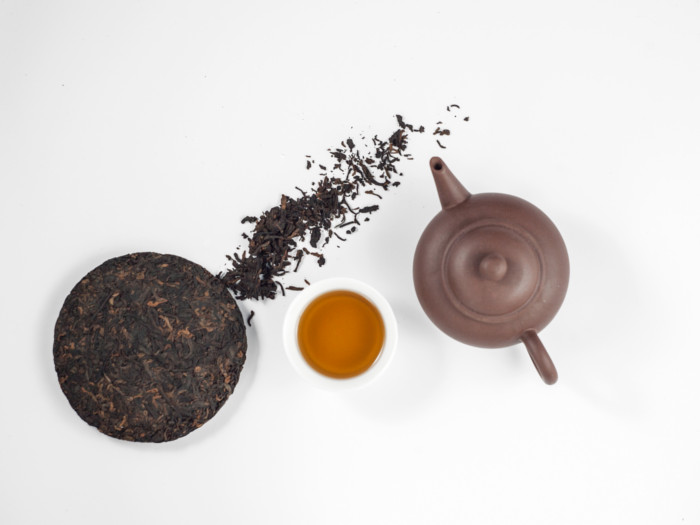There are hundreds of tea varieties available but fermented tea is a particular variant of standard tea that has a unique flavor, color, and history. It may also provide a number of health benefits, even some that traditional tea doesn’t offer. Before adding fermented tea to your daily or weekly health regimen, it is important to understand where it comes from, how it differs from normal tea, and what potential health effects and side effects it can have.
Table of Contents
What is Fermented Tea?
Quite simply, fermented tea is a form of tea that has been exposed to microbes and allowed to ferment. Regular tea leaves are often referred to as “semi-fermented” because basic exposure to air begins certain oxidative processes. When yeast, bacteria, or mold is added to the mix, full fermentation can occur. This fermenting process can take as little as one day, but some tea leaves are prepared under these conditions for years before they are used. Teas may undergo very brief periods of fermentation (Red teas in China), moderately long periods (blue-green tea), or very long fermentation time (post-fermented teas, e.g. Pu-erh). [11]
The exposure to microbes, as well as moisture, allows the tea leaves to undergo an impressive transformative process of oxidation. This causes the leaves to darken, in addition to the release of certain microbes and metabolites that may benefit the overall health. The taste of fermented tea tends to be a bit milder and less bitter than other tea varieties, making this an extremely popular class of teas in certain countries.
It is believed that this kind of tea originated in China, and was accidentally created for the first time. China and neighboring countries (e.g., Japan, Thailand, etc.) remain the primary consumers of fermented tea in the world. Also, the potential health benefits of this tea style have boosted its popularity around the globe. While kombucha is the most well-known fermented tea in most areas, there are quite a few different types that are enjoyed worldwide. [12]

There are several kinds of fermented tea like puer tea and kombucha. Credit: Shutterstock
Potential Benefits of Fermented Tea
Some potential health benefits of fermented tea include its ability to improve the immune system, support digestive health, boost energy levels, reduce inflammation and increase circulation, among others.
Boosted Immune System
The antibacterial and antibiotic properties of fermented tea are well known, despite the fact that it is created with the help of microbes. This can help balance the bacterial levels in your gut, which is where more than 50% of immune activity occurs in the body, helping to keep your system well protected. [13] [14]
Improved Digestion
Fermented tea is typically rich in probiotics, which is a very good news for your stomach and bacterial balance. Probiotics can stimulate the growth of beneficial bacteria in the stomach, and they are essential for speeding up the digestive process and properly absorbing nutrients. [15]
High Energy Levels
As with most other types of tea, there is a small level of caffeine in fermented tea, which can provide an energy boost if you feel your energy or attitude lagging. There isn’t as much caffeine as you find in a cup of coffee, but the other benefits of fermented tea make up for the slightly weaker caffeine kick. [16]
Increased Circulation
Studies have shown that fermented tea is able to improve circulation within the body by optimizing cardiovascular function and improving the uptake of iron by the body. Increased iron levels mean more red blood cells can be produced to deliver oxygen and other resources to cells around the body. [17]
Reduced Inflammation
Due to the fermentation process, some of the antioxidants and anti-inflammatory compounds found in traditional tea are actually found in higher levels after fermentation. This can give your body a major boost against inflammation and chronic pain. [18] [19] [20]
Heart Health
Research supports fermented tea’s ability to lower triglyceride levels in the body, which is important for those looking out for heart health. Triglycerides are associated with a breakdown of blood vessels and tissues, which increase your risk for heart attacks and strokes. [21] [22]
Risks & Side Effects
While fermented teas are said to have health benefits, the research is limited. Large-scale human trials are needed to understand the therapeutic potential of this beverage. There are several risks and side effects to fermented tea too.
- Risk of contamination: Popular fermented teas like kombucha are often made at home. This increases the risk of it not being sterile. Contaminated fermented tea can cause liver damage, metabolic acidosis, and cutaneous anthrax infections. [23] [24]
- Allergic reactions: There have been reported cases of an allergic reaction, jaundice, nausea, vomiting, and head and neck pain after consumption. [25]
- Alcohol content: If you are following a total avoidance of alcohol, you may want to skip kombucha as it contains some level of alcohol. [26]
List of Famous Fermented Teas
In terms of fermented teas around the world, the most popular varieties come from China, Korea, Japan, Tibet, and Thailand.
- China: Fu Zhuan cha, Pu-erh cha, Lu bian cha and Liu bao cha are four of the popular fermented teas in China and have been produced for hundreds of years.
- Korea: Byeongcha is the primary form of fermented tea in Korea, and goes by other names, such as Tteokcha.
- Japan: Toyama kurocha, Goishicha and Awabancha are all widely available in Japanese tea houses.
- Thailand: Miang is the most popular type of “heicha”, or fermented tea in Thailand.
- Tibet: Simply named, Tibeti has been produced and known in the regions around Tibet for centuries.
- Burma: Lahpet is a type of pickled tea leaf that can be brewed into a tea and is often used in culinary preparations in the country.
